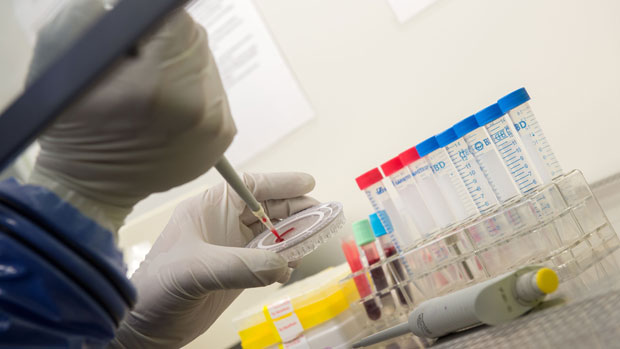Ebola: two children being tested for virus in Newcastle
Children tested in Infectious Diseases Isolation Unit after showing viral symptoms on return from Africa

A free daily email with the biggest news stories of the day – and the best features from TheWeek.com
You are now subscribed
Your newsletter sign-up was successful
Two children are being tested for Ebola at an infectious diseases unit in Newcastle after arriving in the UK from Africa.
Both were said to be showing viral symptoms, although it is has not been confirmed that they had been to one of the affected countries.
The outbreak in West Africa has killed almost 5,700 people in in Liberia, Sierra Leone and Guinea.
The Week
Escape your echo chamber. Get the facts behind the news, plus analysis from multiple perspectives.

Sign up for The Week's Free Newsletters
From our morning news briefing to a weekly Good News Newsletter, get the best of The Week delivered directly to your inbox.
From our morning news briefing to a weekly Good News Newsletter, get the best of The Week delivered directly to your inbox.
The two children are being tested at the Infectious Diseases Isolation Unit at the Royal Victoria Infirmary, with results expected later today.
The unit is one of three outside London that has been prepared to care for Ebola patients or those with other high-risk illnesses. The other units are in Liverpool and Sheffield.
Staff from the Royal Victoria Infirmary took part in national drills to prepare for Ebola earlier this year and have been on alert to deal with any British cases.
Newcastle-on-Tyne's local newspaper, the Evening Chronicle, says plans were in place for staff to work on rotation on a one-to-one basis with a patient over 24 hours in order to strictly adhere to procedure protocol.
A free daily email with the biggest news stories of the day – and the best features from TheWeek.com
Dr Anjam Khan, senior lecturer at the Institute for Cell and Molecular Biosciences at Newcastle University, told the newspaper that people living in the region would have nothing to fear if Ebola patients were treated in the area.
Public Health England has not confirmed which country the children had travelled to but said they were also being screened for malaria.
A spokesperson for Public Health England in the North East said it is "unlikely" they are infected and were being tested as a precaution, reports The Guardian.
"Due to uncertainty about where in Africa the children are from and when they arrived in the UK, as a precaution the children are being tested for Ebola and malaria," he said.
"However, the clinical and PHE risk assessment is that Ebola is unlikely. People who have been in contact with the children have been advised to continue as normal."
Ebola in depth: full coverage of the outbreak
-
 The ‘ravenous’ demand for Cornish minerals
The ‘ravenous’ demand for Cornish mineralsUnder the Radar Growing need for critical minerals to power tech has intensified ‘appetite’ for lithium, which could be a ‘huge boon’ for local economy
-
 Why are election experts taking Trump’s midterm threats seriously?
Why are election experts taking Trump’s midterm threats seriously?IN THE SPOTLIGHT As the president muses about polling place deployments and a centralized electoral system aimed at one-party control, lawmakers are taking this administration at its word
-
 ‘Restaurateurs have become millionaires’
‘Restaurateurs have become millionaires’Instant Opinion Opinion, comment and editorials of the day
-
 A real head scratcher: how scabies returned to the UK
A real head scratcher: how scabies returned to the UKThe Explainer The ‘Victorian-era’ condition is on the rise in the UK, and experts aren’t sure why
-
 How dangerous is the ‘K’ strain super-flu?
How dangerous is the ‘K’ strain super-flu?The Explainer Surge in cases of new variant H3N2 flu in UK and around the world
-
 The ‘menopause gold rush’
The ‘menopause gold rush’Under the Radar Women vulnerable to misinformation and marketing of ‘unregulated’ products
-
 How the care industry came to rely on migrant workers
How the care industry came to rely on migrant workersThe Explainer Government crackdown on recruiting workers abroad risks deepening care sector crisis, industry leaders warn
-
 Could medics' misgivings spell the end of the assisted dying bill?
Could medics' misgivings spell the end of the assisted dying bill?Today's Big Question The Royal College of Psychiatrists has identified 'serious concerns' with the landmark bill – and MPs are taking notice
-
 Washwood Heath: Birmingham's pioneering neighbourhood health service
Washwood Heath: Birmingham's pioneering neighbourhood health serviceIn the Spotlight NHS England chair says there is a 'really good argument this is the model for the future'
-
 The UK's first legal drug consumption room
The UK's first legal drug consumption roomThe Explainer 'Potentially transformative moment in UK drugs policy' as The Thistle opens in Glasgow
-
 How can the UK solve the adult social care crisis?
How can the UK solve the adult social care crisis?Today's Big Question New commission announced to turn our buckling care sector around: yet more delay or finally a way forward?